
Thessaloniki: The Vibrant Heart of Northern Greece
Thessaloniki, the second-largest city in Greece, is a lively and historic metropolis, blending ancient ruins with modern attractions. Nestled by the Thermaic Gulf, the city boasts a rich cultural heritage, with landmarks from the Roman, Byzantine, and Ottoman eras. The White Tower, an iconic symbol of Thessaloniki, offers stunning views of the city and the sea. Strolling through the city, you'll encounter bustling markets, such as Modiano and Kapani, where you can sample local delicacies and purchase unique souvenirs. The city's diverse culinary scene, influenced by its multicultural history, features delicious dishes like bougatsa, a creamy custard-filled pastry, and the famous Thessaloniki-style gyros. Thessaloniki is also known for its vibrant nightlife, with numerous bars, clubs, and live music venues catering to all tastes. The city's waterfront promenade, lined with cafes and restaurants, is the perfect place to unwind and soak in the beautiful sunsets. For history enthusiasts, the Archaeological Museum and the Museum of Byzantine Culture offer fascinating insights into the region's past. Whether you're exploring the ancient city walls, relaxing at Aristotelous Square, or discovering hidden gems in Ano Poli (Upper Town), Thessaloniki promises an unforgettable experience for every traveler.
Local tips in Thessaloniki
- Visit the White Tower early in the morning to avoid crowds and enjoy a peaceful view.
- Try local delicacies at Modiano and Kapani markets for an authentic taste of Thessaloniki.
- Walk along the waterfront promenade at sunset for breathtaking views and a relaxing atmosphere.
- Explore Ano Poli to experience the city's old-world charm and discover hidden historical treasures.
- Use public transportation or rent a bike to navigate the city easily and efficiently.
Neighbourhoods in Thessaloniki
Thessaloniki: The Vibrant Heart of Northern Greece
Thessaloniki, the second-largest city in Greece, is a lively and historic metropolis, blending ancient ruins with modern attractions. Nestled by the Thermaic Gulf, the city boasts a rich cultural heritage, with landmarks from the Roman, Byzantine, and Ottoman eras. The White Tower, an iconic symbol of Thessaloniki, offers stunning views of the city and the sea. Strolling through the city, you'll encounter bustling markets, such as Modiano and Kapani, where you can sample local delicacies and purchase unique souvenirs. The city's diverse culinary scene, influenced by its multicultural history, features delicious dishes like bougatsa, a creamy custard-filled pastry, and the famous Thessaloniki-style gyros. Thessaloniki is also known for its vibrant nightlife, with numerous bars, clubs, and live music venues catering to all tastes. The city's waterfront promenade, lined with cafes and restaurants, is the perfect place to unwind and soak in the beautiful sunsets. For history enthusiasts, the Archaeological Museum and the Museum of Byzantine Culture offer fascinating insights into the region's past. Whether you're exploring the ancient city walls, relaxing at Aristotelous Square, or discovering hidden gems in Ano Poli (Upper Town), Thessaloniki promises an unforgettable experience for every traveler.
When is the best time to go to Thessaloniki?
Iconic landmarks you can’t miss
White Tower of Thessaloniki
Explore Thessaloniki's iconic White Tower: a historic landmark offering panoramic views and a glimpse into the city's rich past.
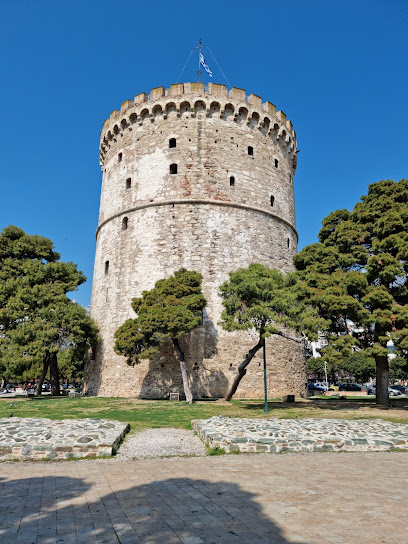
Aristotelous Square
Experience the grandeur of Thessaloniki's central square, a blend of history, culture, and stunning waterfront views.

The Umbrellas Sculpture by Zongolopoulos
Thessaloniki's iconic waterfront sculpture: a whimsical and artistic landmark by George Zongolopoulos, symbolizing the city's vibrant culture.
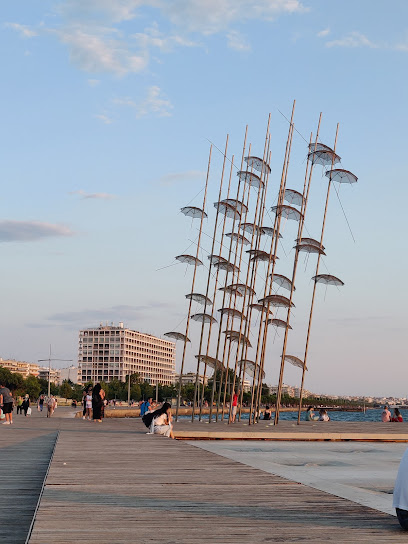
Arch of Galerius
A majestic Roman monument in Thessaloniki, the Arch of Galerius commemorates imperial victory and showcases intricate ancient artistry.
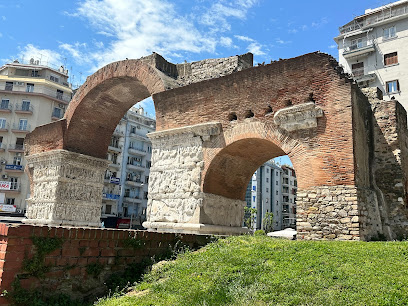
Atatürk Museum
Explore the birthplace of Mustafa Kemal Atatürk, founder of modern Turkey, in this historical house museum in Thessaloniki.
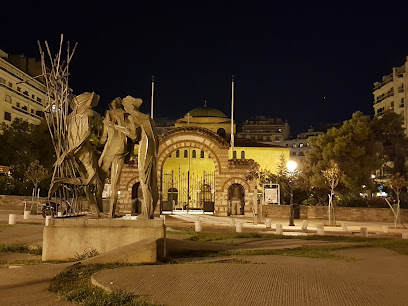
Archaeological Museum of Thessaloniki
Discover ancient Macedonia's treasures at Thessaloniki's Archaeological Museum, from prehistoric artifacts to the gold of kings.
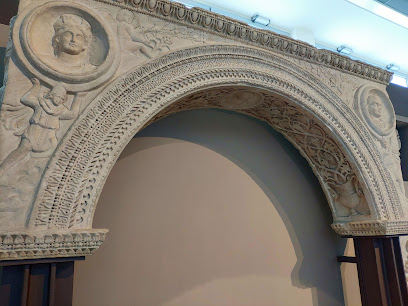
Trigoniou (Chain) Tower
Explore Thessaloniki's history at the Trigoniou Tower, a 15th-century fortress offering panoramic city views from its strategic location in Ano Poli.
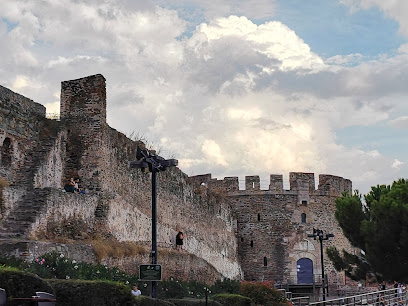
Holy Church of Saint Demetrius, Patron Saint of Thessalonica
Explore Thessaloniki's patron saint's basilica: a UNESCO site with stunning mosaics, a historic crypt, and centuries of religious significance.

Holy Church of Hagia Sophia
Explore Thessaloniki's Hagia Sophia: A UNESCO World Heritage Site with Byzantine mosaics and a rich, transformative history.

Heptapyrgion of Thessaloniki
Explore Thessaloniki's historic Heptapyrgion fortress, from its ancient walls to panoramic views, and discover its captivating past.
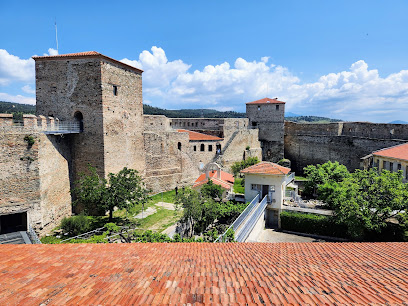
Roman Forum of Thessaloniki
Discover ancient Thessaloniki's heart at the Roman Forum: Explore ruins, museums, and historical landmarks in the city center.
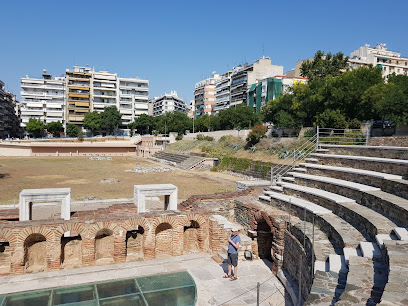
Rotunda
Explore Thessaloniki's ancient Rotunda: a Roman monument transformed into a church and mosque, showcasing stunning mosaics and rich history.
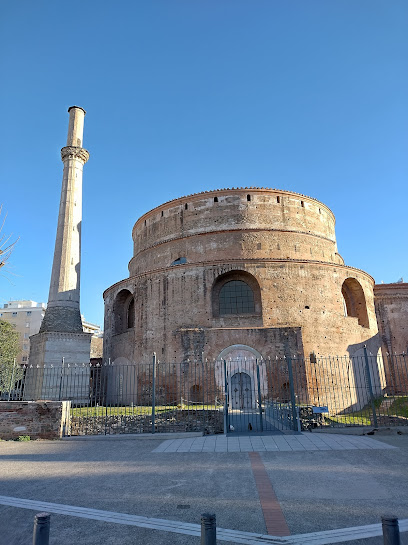
Garden of Remembrance
Discover a peaceful retreat in Thessaloniki's Garden of Remembrance, where history and natural beauty intertwine to create a serene escape.
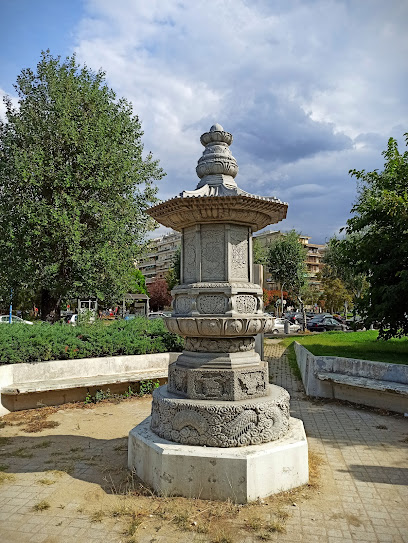
Museum of Byzantine Civilization
Explore Byzantine art, history, and culture at this award-winning museum in Thessaloniki. A captivating journey through a fascinating empire.
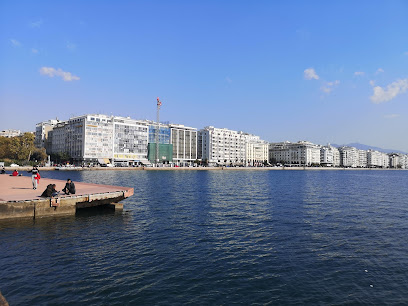
Acropolis of Thessaloniki
Explore Thessaloniki's Acropolis: A historic landmark with stunning views, ancient ruins, and a rich cultural heritage.
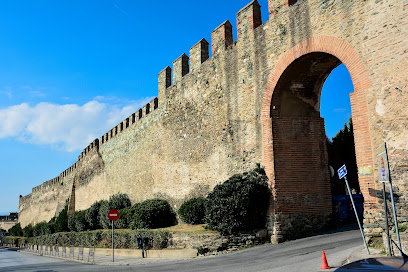
Unmissable attractions to see
Aristotelous Square
Experience the grandeur of Aristotelous Square, Thessaloniki's central hub for culture, history, and stunning waterfront views.
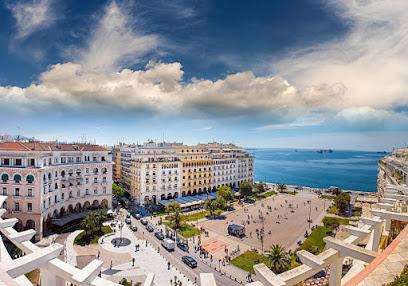
Agora Modiano
Experience Thessaloniki's vibrant culinary scene at Agora Modiano, a historic food market offering local and international flavors.
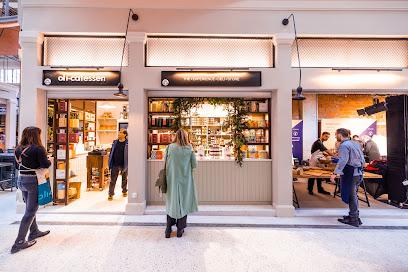
Holy Church of Saint Demetrius, Patron Saint of Thessalonica
Explore the stunning Byzantine mosaics and historical crypt of Thessaloniki's Holy Church of Saint Demetrius, a UNESCO World Heritage Site.
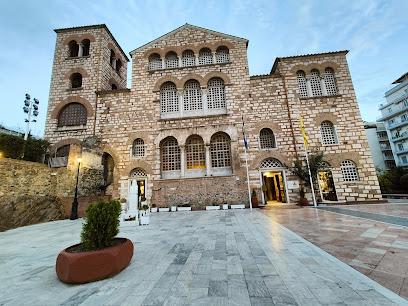
Thessaloniki Concert Hall
Experience world-class performances and stunning architecture at Thessaloniki Concert Hall, a cultural landmark on the city's vibrant waterfront.
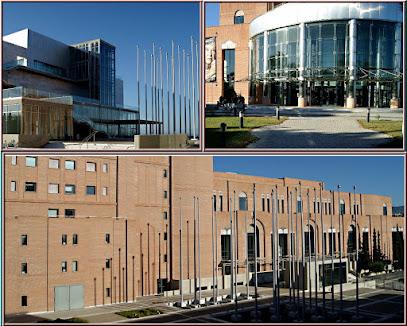
Archaeological Museum of Thessaloniki
Explore Macedonia's ancient past through fascinating artifacts at the Archaeological Museum of Thessaloniki, a treasure trove of history and culture.
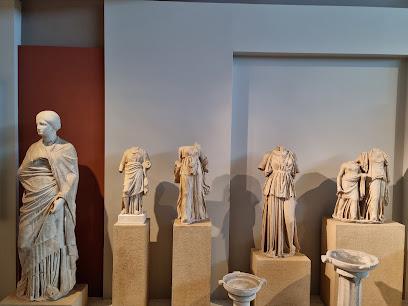
Triangle Tower
Explore Thessaloniki's history at the Triangle Tower: panoramic views, ancient walls, and Ottoman legacy in the Upper Town.
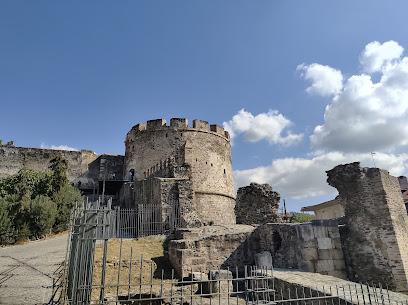
Holy Church of Hagia Sophia
Explore Thessaloniki's Holy Church of Hagia Sophia, a UNESCO World Heritage Site with stunning Byzantine art and a rich, transformative history.
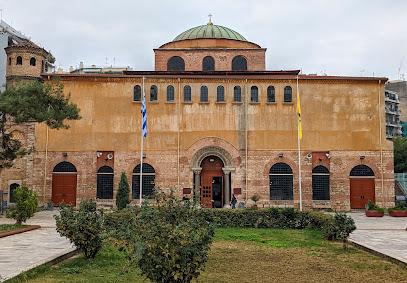
Heptapyrgion of Thessaloniki
Explore Thessaloniki's historic Heptapyrgion Fortress, a Byzantine and Ottoman-era landmark with stunning views and a chilling past as a notorious prison.
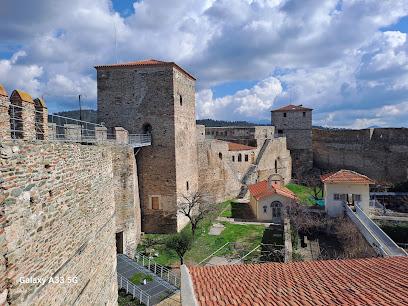
Roman Forum of Thessaloniki
Explore Thessaloniki's Roman heart: Uncover the ruins of the ancient forum, marketplace, and theater in the city center.
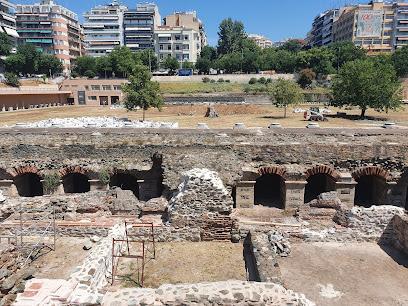
Rotunda
Explore Thessaloniki's ancient Rotunda: a Roman monument transformed into a church, mosque, and museum, showcasing centuries of history and art.
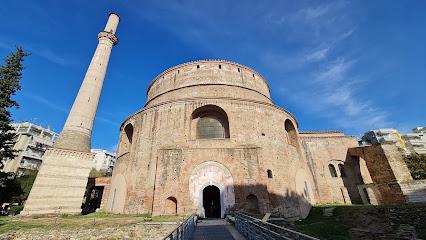
Thermi Dam
Discover a peaceful nature escape at Thermi Dam, a short trip from Thessaloniki, perfect for outdoor activities and relaxation.
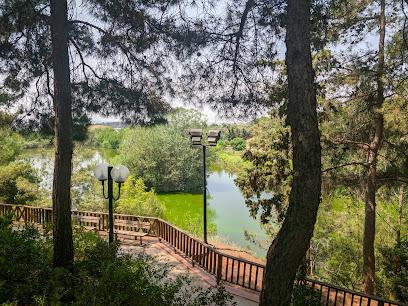
SKYLINE - OTE Tower
Experience Thessaloniki from above at the OTE Tower's Skyline Bar: revolving views, delicious treats, and unforgettable moments.
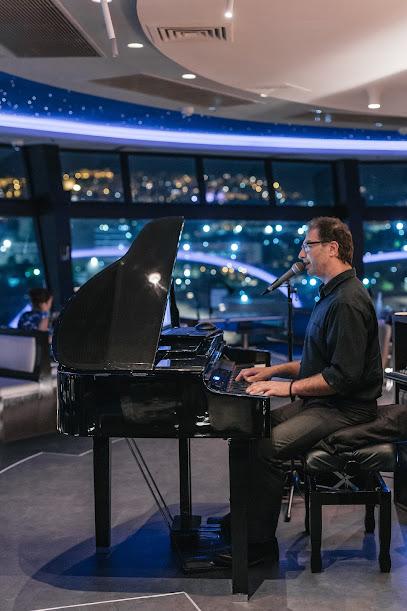
Museum of Byzantine Civilization
Explore the art, history, and culture of the Byzantine Empire at Thessaloniki's renowned Museum of Byzantine Culture.
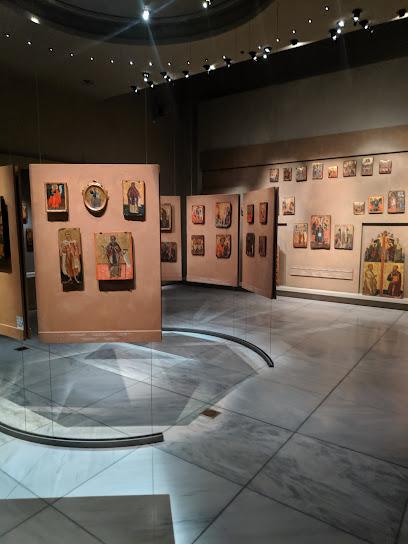
Acropolis of Thessaloniki
Explore Thessaloniki's Acropolis: a historic fortress offering panoramic views, rich history, and a glimpse into the city's cultural heritage.
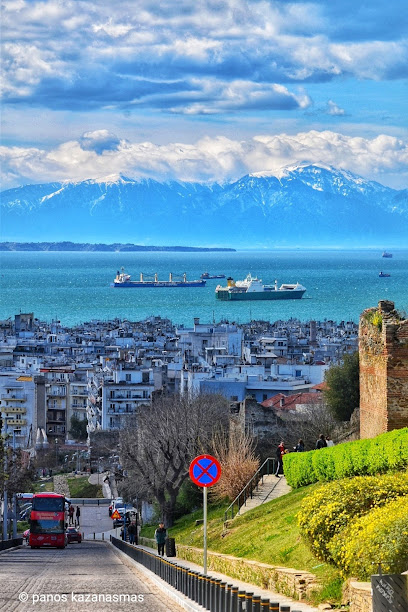
Vlatadon Monastery
Discover Thessaloniki's Byzantine past at the Vlatadon Monastery, a UNESCO World Heritage Site with stunning views and rich history.
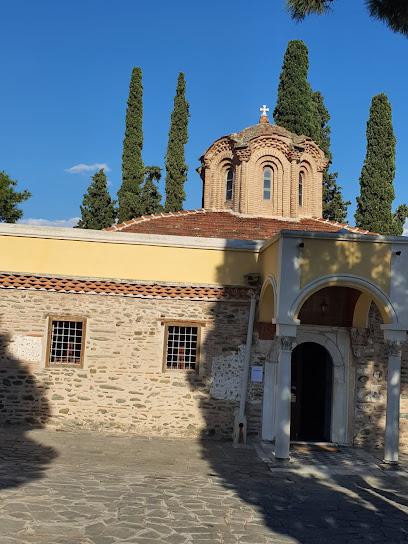
Essential places to dine
Kitchen Bar
Discover Kitchen Bar in Thessaloniki - where exquisite seafood meets breathtaking waterfront views in a vibrant dining atmosphere.
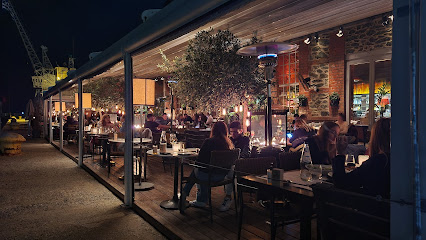
NAVONA Day & Night
Discover authentic Italian cuisine at NAVONA Day & Night in Thessaloniki – where exquisite flavors meet elegant ambiance.
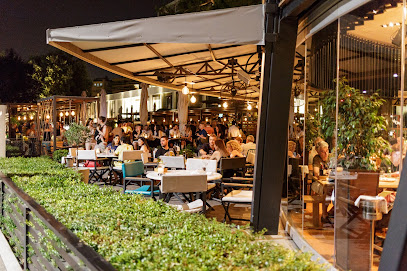
The Rouga
Experience authentic Greek cuisine at The Rouga in Thessaloniki - where tradition meets modern culinary artistry.
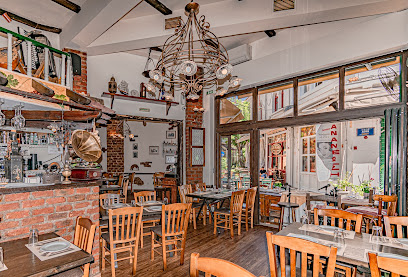
The Greek
Savor authentic Mediterranean cuisine at The Greek, where fresh seafood and traditional dishes bring the essence of Greece to life in Thessaloniki.
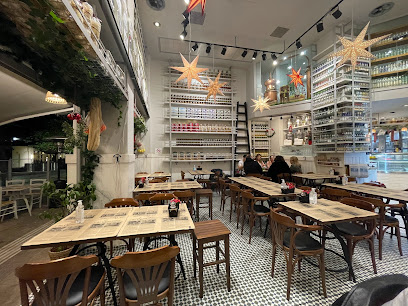
Mamalouka
Savor the taste of Greece at Mamalouka - an authentic dining experience in Thessaloniki with fresh ingredients and rich flavors.
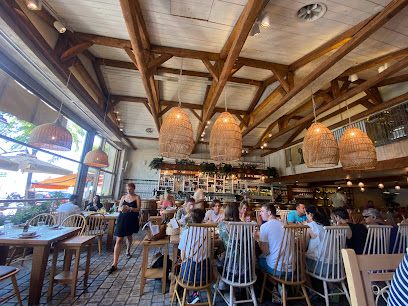
Garçon Brasserie
Savor exquisite Mediterranean flavors at Garçon Brasserie in Thessaloniki, where culinary excellence meets stunning seaside views.
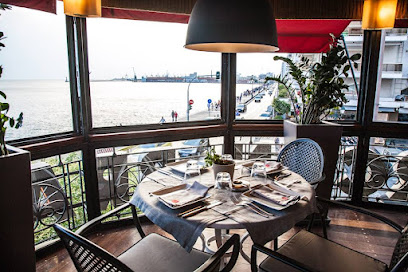
Wall by Wall
Experience authentic Mediterranean dining at Wall by Wall in Thessaloniki - where every meal tells a story.
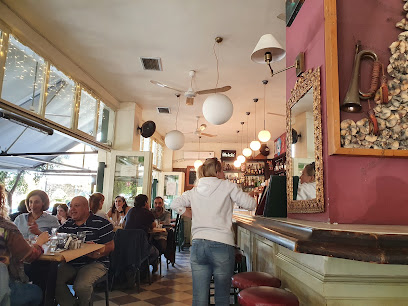
Charoupi
Experience authentic Greek cuisine at Charoupi in Thessaloniki – where every dish tells a story of tradition and flavor.
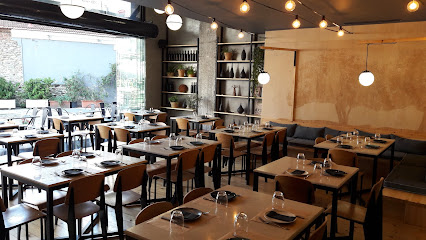
Sebriko
Discover Sebriko in Thessaloniki - where eclectic cuisine meets modern dining in a cozy atmosphere filled with local flavors.
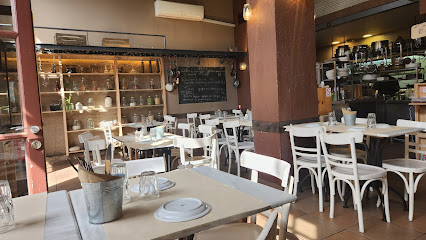
Palati Thessaloniki
Discover Palati Thessaloniki - where authentic Greek flavors meet vibrant live music in an unforgettable dining experience.
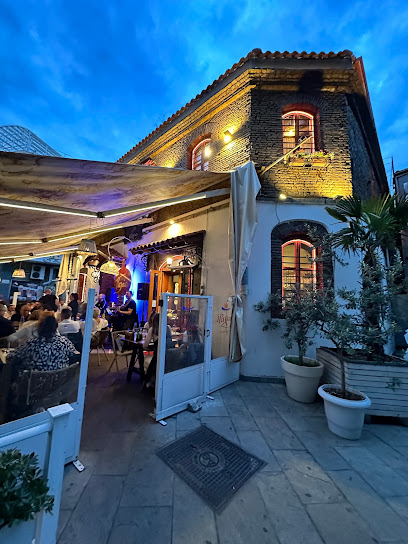
Loupino
Discover authentic Greek flavors at Loupino in Thessaloniki - where tradition meets modern dining in a vibrant setting.
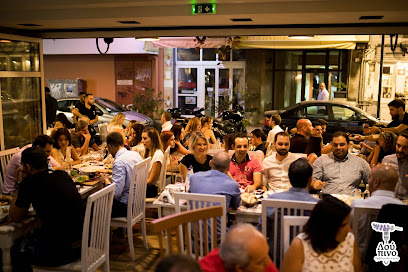
Tsinari tavern
Experience the authentic flavors of Greece at Tsinari Tavern in Thessaloniki – a culinary delight for every food lover.
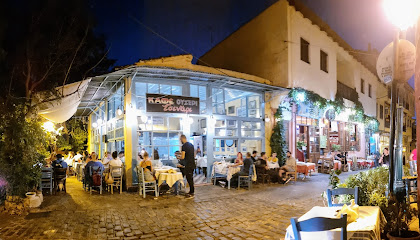
Salento Wood Fired Street Food
Experience authentic Italian wood-fired pizzas and brunch delights at Salento Wood Fired Street Food in Thessaloniki.
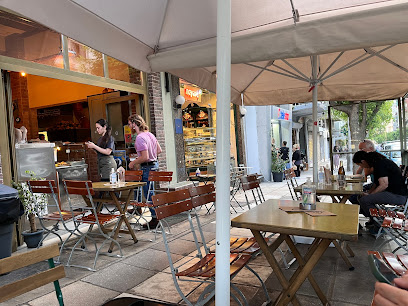
Kanoula
Discover authentic Greek cuisine at Kanoula in Thessaloniki—where traditional flavors meet warm hospitality.
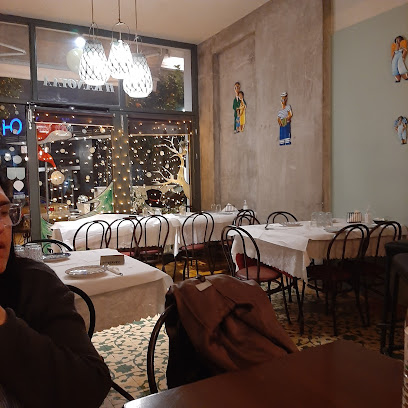
Tsarouchas Restaurant
Discover the essence of Greek cuisine at Tsarouchas Restaurant in Thessaloniki - where tradition meets taste in every dish.
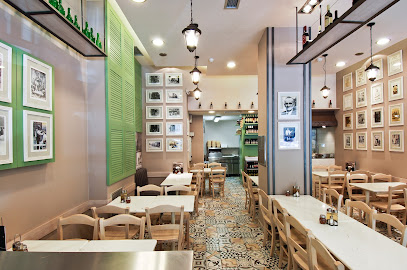
Markets, malls and hidden boutiques
Mediterranean Cosmos
Discover the vibrant shopping, dining, and entertainment options at Mediterranean Cosmos, Thessaloniki's top shopping mall and a tourist's paradise.
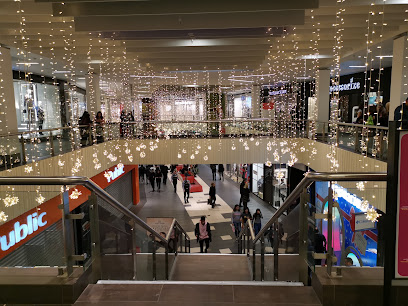
One Salonica Outlet Mall
Discover a shopping haven at One Salonica Outlet Mall in Thessaloniki, where fashion meets affordability and culinary delights await.
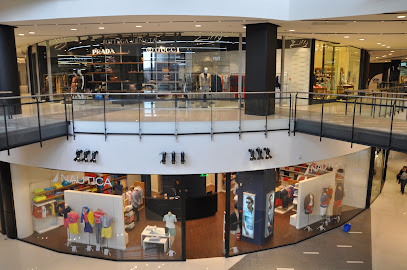
Εμπορικό Κέντρο Πλατεία
Discover Εμπορικό Κέντρο Πλατεία: Thessaloniki’s premier shopping mall with a mix of local flair and international brands, perfect for every shopper.
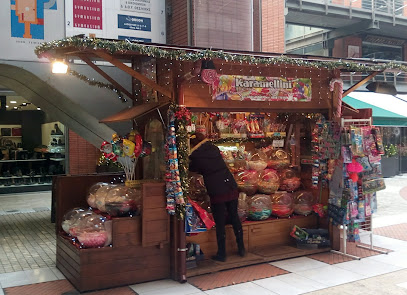
Baron Hirsch Hall
Explore Baron Hirsch Hall in Thessaloniki: A shopping paradise with local charm, diverse eateries, and a lively atmosphere perfect for tourists.
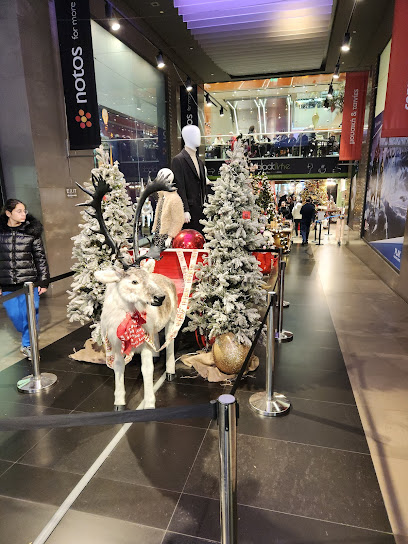
Bubblegun
Discover the latest trends in women’s fashion at Bubblegun, Thessaloniki's premier clothing boutique for stylish apparel and accessories.
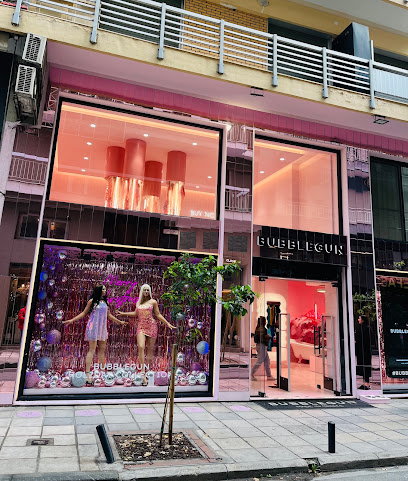
notos Θεσσαλονίκη (Thessaloniki)
Explore Notos, Thessaloniki's premier department store, offering a blend of local and global shopping experiences in a vibrant setting.
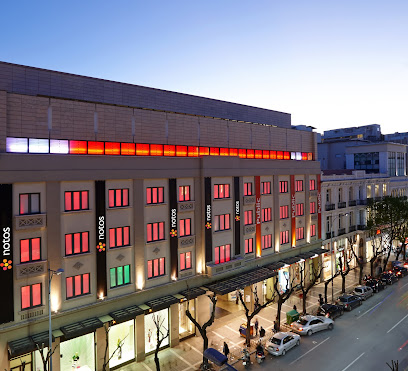
Flying Tiger Copenhagen
Explore the colorful and quirky offerings of Flying Tiger Copenhagen, your go-to gift shop in Thessaloniki for unique finds and fun surprises.
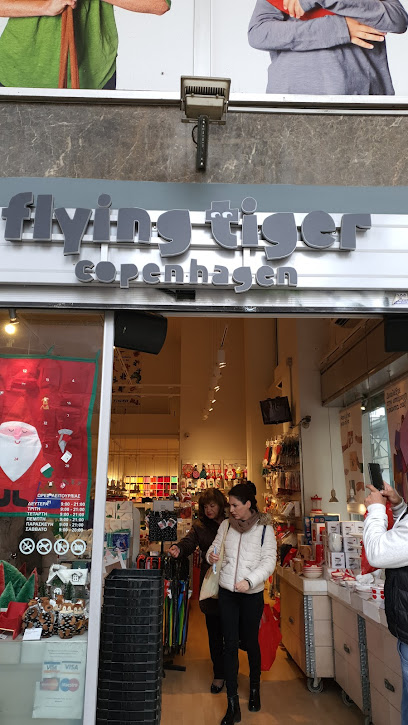
OtakuStore.gr
Explore the ultimate shopping destination for anime, manga, and gaming in Thessaloniki at OtakuStore.gr, where passion meets merchandise.
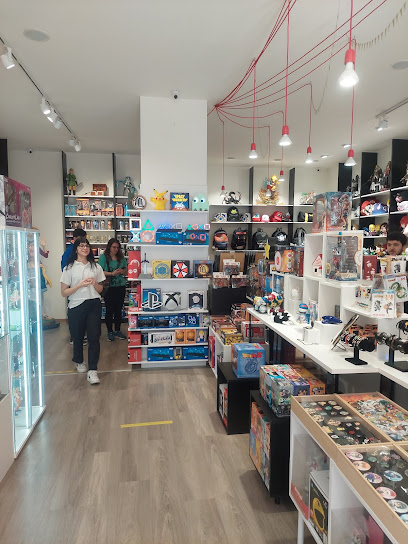
American Market
Explore Thessaloniki's American Market, where diverse shopping meets local culture, offering a unique selection of army surplus and more.
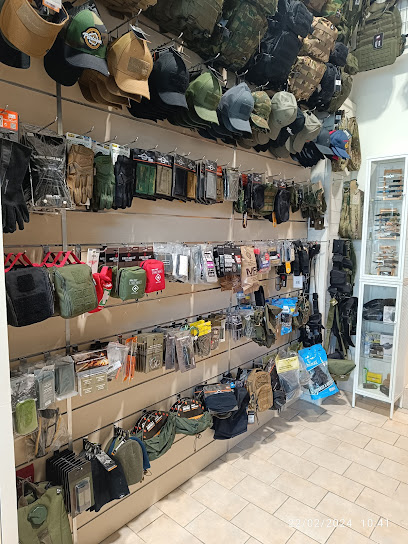
GREEK ART SOUVENIRS VAMVOUKAKIS
Explore a world of handcrafted Greek art and unique souvenirs at Vamvoukas' Souvenir Store in Thessaloniki, where every piece tells a story.
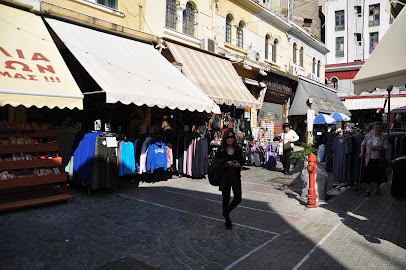
The Anime House!
Discover a vibrant world of anime merchandise at The Anime House in Thessaloniki, where fans unite over their favorite series and characters.
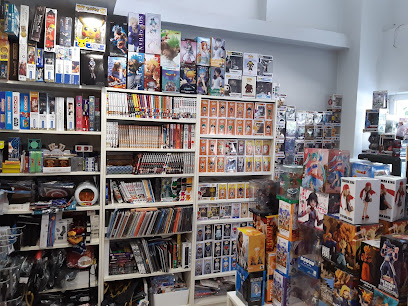
90s Closet
Explore 90s Closet in Thessaloniki for a unique vintage shopping experience, featuring iconic styles and rare finds from the unforgettable 1990s era.
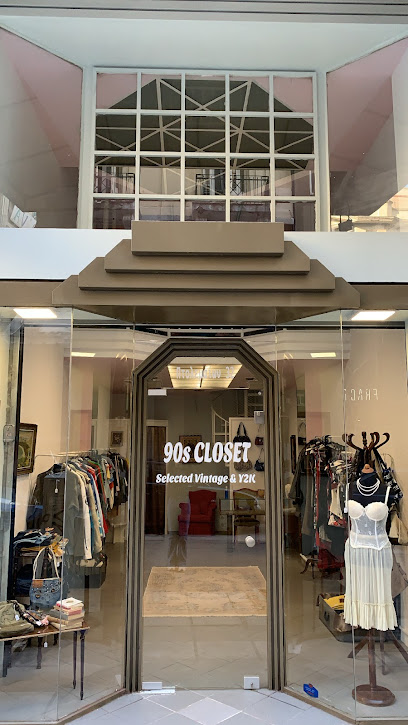
I Love Thessaloniki
Discover unique souvenirs that reflect Thessaloniki's vibrant culture at I Love Thessaloniki, the perfect shop for memorable keepsakes.
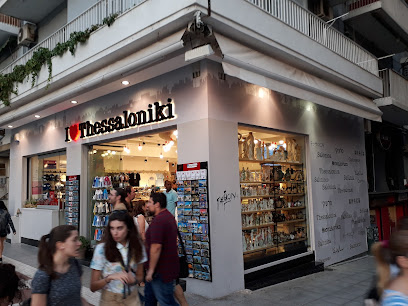
Access
Discover contemporary women's fashion at Access in Thessaloniki, where style meets quality in an inviting shopping experience.
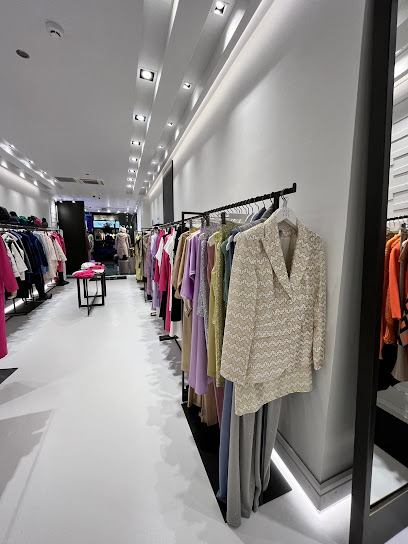
V for Vintage
Explore V for Vintage in Thessaloniki for a unique shopping experience filled with timeless clothing treasures and local fashion flair.

Essential bars & hidden hideouts
Dentro sto Bar
Discover Dentro sto Bar in Thessaloniki: a vibrant bar offering an array of drinks and a lively atmosphere perfect for socializing.
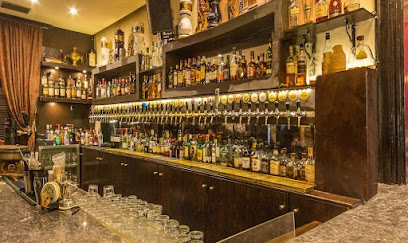
CHILAI wine - restaurant - bar
Experience the best of Thessaloniki at CHILAI, where exquisite wines and delightful dishes create unforgettable moments.
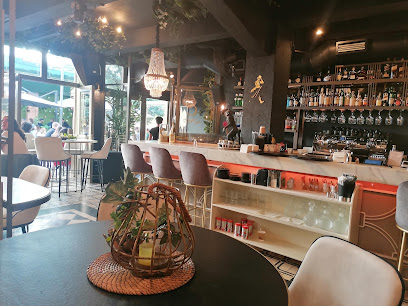
Kafodeio Greek
Discover the vibrant atmosphere of Kafodeio Greek in Thessaloniki, where exceptional coffee, live music, and a welcoming ambiance await.
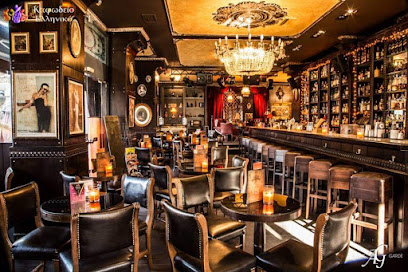
Pulp
Discover the vibrant nightlife of Thessaloniki at Pulp Bar, where delicious drinks and a lively atmosphere await every traveler.
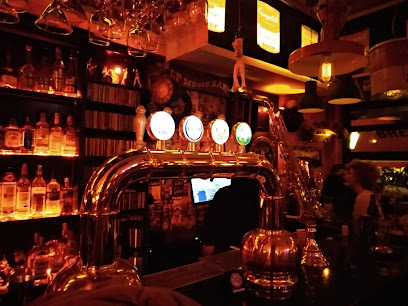
Thermaikos Bar
Experience the unique charm of Thermaikos Bar, a dog-friendly haven in Thessaloniki offering delightful drinks and a welcoming atmosphere for all.
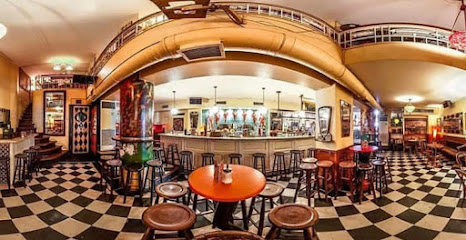
Sherlock Bar SKG
Discover the vibrant atmosphere of Sherlock Bar SKG in Thessaloniki, where creative cocktails and local charm meet stunning waterfront views.
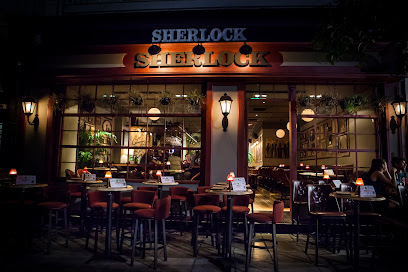
Vogatsikou 3
Discover the vibrant ambiance and unique cocktails at Vogatsikou 3, a must-visit cocktail bar in the heart of Thessaloniki.
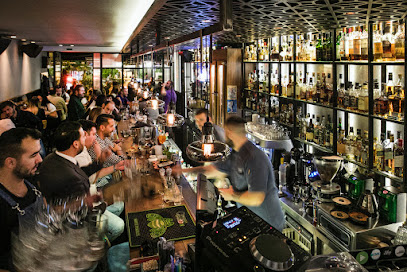
The Nectar Distillery
Experience the vibrant nightlife of Thessaloniki at The Nectar Distillery, where innovative cocktails and a lively atmosphere await.
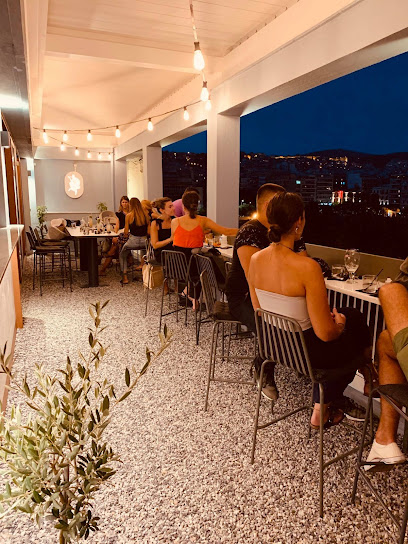
On The Road
Experience the vibrant atmosphere and local flavors at On The Road, Thessaloniki's top bar and cafe destination.
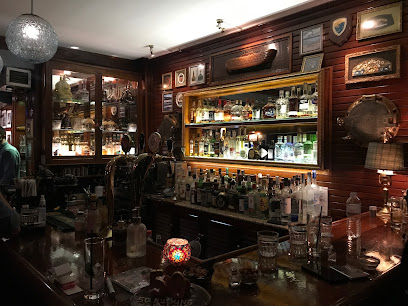
Wonderwall Fun Bar
Discover the vibrant nightlife at Wonderwall Fun Bar in Thessaloniki, where cocktails, live music, and a friendly atmosphere await you.
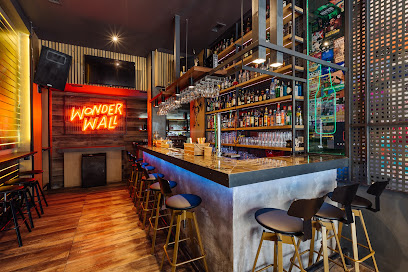
Saxofono | Cocktail Bar
Experience the vibrant nightlife at Saxofono Cocktail Bar in Thessaloniki, offering creative cocktails and an inviting atmosphere for all visitors.
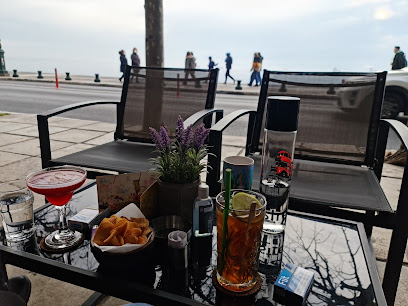
MOJO cocktail & wine bar
Discover the vibrant atmosphere of MOJO Cocktail & Wine Bar in Thessaloniki, where crafted cocktails and fine wines meet modern elegance.
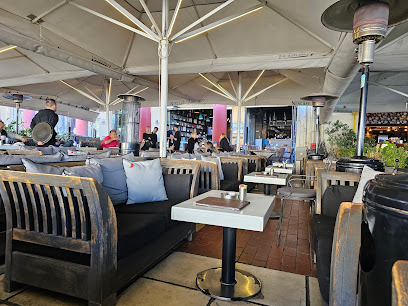
Le Coq tail mix bar
Experience the vibrant nightlife of Thessaloniki at Le Coq Tail Mix Bar, where exquisite cocktails and a lively atmosphere await every visitor.
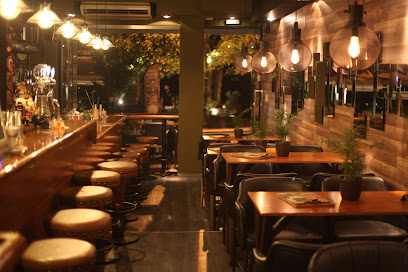
OLD str. Downtown Bar
Discover the lively atmosphere and delicious drinks at OLD str. Downtown Bar in Thessaloniki, a perfect spot for unwinding after a day of exploration.
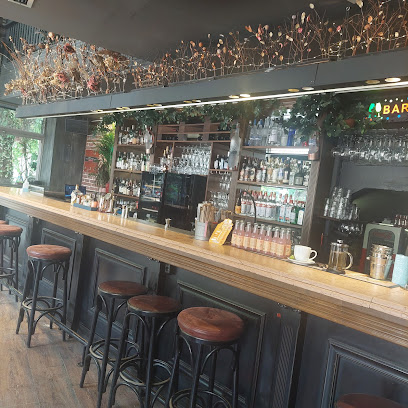
BOCA music bar
Discover the vibrant nightlife of Thessaloniki at BOCA Music Bar, where eclectic music and a lively atmosphere come together for an unforgettable experience.
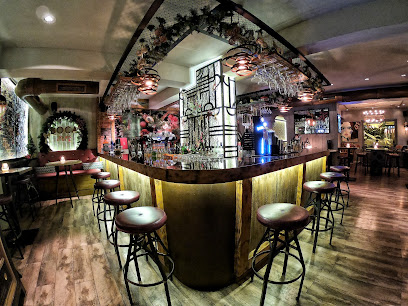
Local Phrases
-
- HelloΓεια σας
[Ya sas] - GoodbyeΑντίο
[Adio] - YesΝαι
[Ne] - NoΌχι
[Ohi] - Please/You're welcomeΠαρακαλώ
[Parakalo] - Thank youΕυχαριστώ
[Efharisto] - Excuse me/SorryΣυγνώμη
[Signomi] - How are you?Τι κάνετε;
[Ti kanete?] - Fine. And you?Καλά. Εσείς;
[Kala. Eseis?] - Do you speak English?Μιλάτε Αγγλικά;
[Milate Agglika?] - I don't understandΔεν καταλαβαίνω
[Den katalaveno]
- HelloΓεια σας
-
- I'd like to see the menu, pleaseΘα ήθελα να δω το μενού, παρακαλώ
[Tha ithela na do to menu, parakalo] - I don't eat meatΔεν τρώω κρέας
[Den troo kreas] - Cheers!Υγεία!
[Iyia!] - I would like to pay, pleaseΘα ήθελα να πληρώσω, παρακαλώ
[Tha ithela na plirosso, parakalo]
- I'd like to see the menu, pleaseΘα ήθελα να δω το μενού, παρακαλώ
-
- Help!Βοήθεια!
[Voi-thee-a!] - Go away!Φύγε!
[Fi-ge!] - Call the Police!Καλέστε την Αστυνομία!
[Ka-le-ste tin Asti-no-mia!] - Call a doctor!Καλέστε ένα γιατρό!
[Ka-le-ste ena giatro!] - I'm lostΈχω χαθεί
[Eho ha-thee] - I'm illΕίμαι άρρωστος
[E-mai a-ro-stos]
- Help!Βοήθεια!
-
- I'd like to buy...Θα ήθελα να αγοράσω...
[Tha ithela na agorasoo...] - I'm just lookingΑπλά κοιτάω
[Apla kito] - How much is it?Πόσο κοστίζει;
[Poso kostizi?] - That's too expensiveΑυτό είναι πολύ ακριβό
[Afto ine poli akribo] - Can you lower the price?Μπορείτε να μειώσετε την τιμή;
[Borite na miosete tin timi?]
- I'd like to buy...Θα ήθελα να αγοράσω...
-
- What time is it?Τι ώρα είναι;
[Ti ora ine?] - It's one o'clockΕίναι μία ώρα
[E-ne mia ora] - Half past (10)Μισή (10)
[Mi-si (dek-a)] - MorningΠρωί
[Pro-ee] - AfternoonΑπόγευμα
[A-po-yef-ma] - EveningΒράδυ
[Vra-doo] - YesterdayΧθες
[Hthes] - TodayΣήμερα
[Si-me-ra] - TomorrowΑύριο
[Av-rio] - 1Ένα
[E-na] - 2Δύο
[Thi-o] - 3Τρία
[Tri-a] - 4Τέσσερα
[Tes-ser-a] - 5Πέντε
[Pen-de] - 6Έξι
[E-xi] - 7Εφτά
[Ef-ta] - 8Οκτώ
[Ok-to] - 9Εννέα
[En-ne-a] - 10Δέκα
[Dek-a]
- What time is it?Τι ώρα είναι;
-
- Where's a/the...?Πού είναι ένα/το...;
[Poo ine ena/to...?] - What's the address?Ποια είναι η διεύθυνση;
[Pia ine ee dhee-ef-thin-see?] - Can you show me (on the map)?Μπορείτε να μου δείξετε (στο χάρτη);
[Borite na mou dixete (sto har-ti)?] - When's the next (bus)?Πότε είναι το επόμενο (λεωφορείο);
[Pote ine to e-pom-eno (le-o-foree-o)?] - A ticket (to ....)Ένα εισιτήριο (για ....)
[Ena ees-ee-tee-ree-o (ya ....)]
- Where's a/the...?Πού είναι ένα/το...;
History of Thessaloniki
-
Thessaloniki was founded in 315 BC by Cassander of Macedon, who named the city after his wife Thessalonike, the sister of Alexander the Great. The city's strategic location along the Thermaic Gulf and its connection to the Via Egnatia, a major Roman road, made it an important commercial hub in the ancient world.
-
During the Roman era, Thessaloniki grew in significance and became the capital of the Roman province of Macedonia. The city's prosperity is evidenced by the construction of monumental buildings such as the Roman Forum, the Galerian Complex, and the Arch of Galerius. The Apostle Paul also visited Thessaloniki during his second missionary journey, establishing one of the earliest Christian communities in the city.
-
Thessaloniki flourished during the Byzantine era as one of the empire's most important cities. The city was renowned for its architectural and artistic achievements, including the construction of several significant churches like the Hagia Sophia and the Rotunda. Thessaloniki also played a crucial role in the spread of Christianity and the development of Byzantine culture.
-
In 1430, Thessaloniki fell to the Ottoman Empire and remained under Ottoman control for nearly five centuries. During this period, the city became a melting pot of cultures and religions, with significant Jewish, Muslim, and Christian communities coexisting. The city's architecture was also influenced by Ottoman styles, with notable examples including the Alaca Imaret and the White Tower.
-
Thessaloniki was incorporated into the modern Greek state in 1912 during the Balkan Wars. The city experienced significant growth and modernization, especially after the devastating Great Fire of 1917, which led to extensive rebuilding efforts. Thessaloniki also played a crucial role during both World Wars and the Greek Civil War, shaping its contemporary identity.
-
Today, Thessaloniki is a vibrant cultural center known for its rich history, diverse architecture, and dynamic arts scene. The city's annual International Film Festival and the Thessaloniki International Fair are significant cultural events that attract visitors from around the world. Additionally, the city's numerous museums, galleries, and historical sites continue to celebrate its illustrious past and cultural heritage.
Thessaloniki Essentials
-
Thessaloniki is accessible via Thessaloniki Airport 'Makedonia' (SKG), which is about 15 km from the city center. The airport serves numerous international and domestic flights. From the airport, you can take a taxi, a bus (Line 01X/01N), or rent a car to reach the city. Thessaloniki is also well-connected by train and intercity buses to major cities in Greece and neighboring countries.
-
Public transportation in Thessaloniki includes buses operated by OASTH, which cover the city and its suburbs. Tickets can be purchased at kiosks or on the bus. Taxis are widely available and relatively inexpensive. For more flexibility, consider renting a car. Thessaloniki is also bike-friendly, with several bike rental services available. Walking is a great option for exploring the city's historical center.
-
The official currency in Greece is the Euro (EUR). Credit and debit cards are widely accepted in hotels, restaurants, and shops. ATMs are abundant throughout Thessaloniki for cash withdrawals. However, it's advisable to carry some cash, especially when visiting smaller establishments or markets.
-
Thessaloniki is generally safe for tourists, but standard precautions should be taken. Be cautious of pickpockets in crowded areas like Aristotelous Square and the Ladadika district. Avoid walking alone late at night in less populated areas. Neighborhoods such as Vardaris and parts of the Ano Poli can have higher crime rates, so stay vigilant and aware of your surroundings.
-
In case of emergency, dial 112 for immediate assistance. Thessaloniki has well-equipped hospitals and clinics. Pharmacies are widely available and can provide over-the-counter medications. It's advisable to have travel insurance that covers medical emergencies. The police station and other emergency services are efficient and helpful.
-
Fashion: Do dress modestly, especially when visiting religious sites. Avoid overly revealing clothing. Religion: Do respect local customs and traditions. Always cover your head and wear appropriate attire in churches. Public Transport: Do validate your ticket before boarding. Don't eat or drink on public transport. Greetings: Do greet people with a handshake or a friendly 'Kalimera' (Good morning). Eating & Drinking: Do try local delicacies and accept food and drink offerings graciously. Don't leave a tip on the table; hand it directly to the server.
-
To experience Thessaloniki like a local, visit the Modiano and Kapani markets for fresh produce and local products. Take a leisurely stroll along the Nea Paralia waterfront, especially around sunset. Engage with locals in traditional tavernas in the Ladadika district. Don't miss out on trying 'bougatsa' and 'tsoureki,' local culinary delights. For a unique experience, catch a ferry to the nearby Thermaic Gulf islands.
Trending Landmark in Thessaloniki
-
White Tower of Thessaloniki
-
Aristotelous Square
-
The Umbrellas Sculpture by Zongolopoulos
-
Arch of Galerius
-
Atatürk Museum
-
Archaeological Museum of Thessaloniki
-
Trigoniou (Chain) Tower
-
Holy Church of Saint Demetrius, Patron Saint of Thessalonica
-
Holy Church of Hagia Sophia
-
Heptapyrgion of Thessaloniki
-
Roman Forum of Thessaloniki
-
Rotunda
-
Garden of Remembrance
-
Museum of Byzantine Civilization
-
Acropolis of Thessaloniki
Nearby Cities to Thessaloniki
-
Things To Do in Katerini
-
Things To Do in Serres
-
Things To Do in Larissa
-
Things To Do in Kavala
-
Things To Do in Volos
-
Things To Do in Meteora
-
Things To Do in Pogradec
-
Things To Do in Lamia
-
Things To Do in Ioannina
-
Things To Do in Gjilan
-
Things To Do in Delphi
-
Things To Do in Ferizaj
-
Things To Do in Kamenica
-
Things To Do in Alexandroupoli
-
Things To Do in Gjirokastër


















